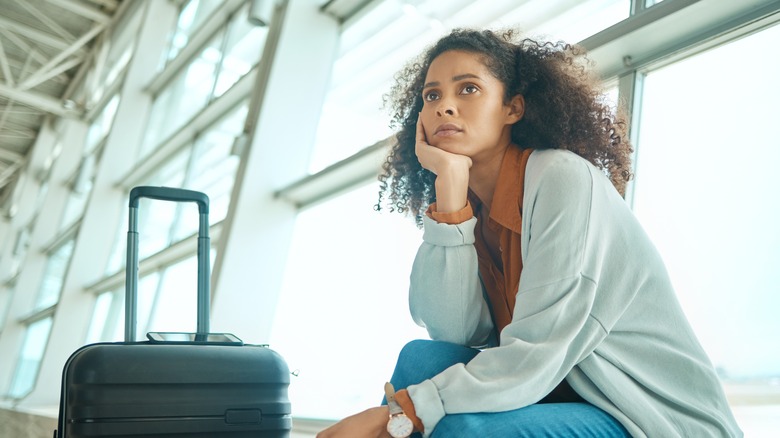The airport can be a stressful place. It’s often crowded, with people rushing around for their flights. You have to deal with security lines, different instructions depending on which airport you’re at, possible pat downs, and getting to the gate on time. Maybe you’re flying with a baby for the first time or taking a difficult trip for a funeral. Perhaps it’s an anticipatory fear of someone acting out on your flight or forgetting something important like medications or vital documents. You might even be thinking about airport anxiety and ways to prevent it before you take your kids on their first airplane trip.
You are not alone, and there are steps you can take to help deal with airport anxiety. We spoke to clinical psychologist Dr. Janina Scarlet, founder of Superhero Therapy, and author of “Unseen, Unheard, Undervalued: Managing Loneliness, Loss of Connection and Not Fitting In” (as well as many other books) about what we can do to help ourselves get through a trip to the airport.
If you or someone you know needs help with mental health, please contact the Crisis Text Line by texting HOME to 741741, call the National Alliance on Mental Illness helpline at 1-800-950-NAMI (6264), or visit the National Institute of Mental Health website.
Airport anxiety causes — and where to start
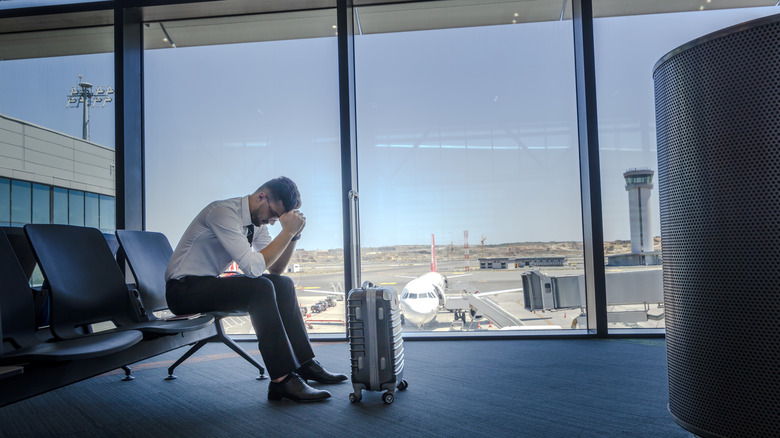
We asked Dr. Scarlet what it is about the airport that causes such anxiety in people. She said that there may be different causes for everyone. She said, “For people with a fear of flying, there might be anticipatory anxiety about getting on the plane. For other individuals (for example, people with social anxiety, people with a history of trauma, neurodivergent people, [and] especially for people with sensory processing issues), seeing a lot of people, hearing a lot of stimulation, noise, and flickering lights, and just a lot of moving bodies can be really overwhelming.”
Dr. Scarlet said that getting to the airport with enough time to acclimate to the environment is the best place to start. “The less we are rushing, the less pressured we may feel, the more likely we are to be able to find a spot that we might find relaxing after we’ve gone through security … I do recommend that people bring something that comforts them. For people with sensory processing issues, it might be noise-canceling headphones or sunglasses or a comfortable hoodie. It might be an audiobook, or it might be a fun game to play on the phone to be able to soothe our anxiety while we’re waiting for our flight to arrive.”
One fear many people have is forgetting something important that can’t be bought where they’re going. Dr. Scarlet suggests having a packing list that can be printed out a day or two before so things can be checked off.
Dealing with crowds and security
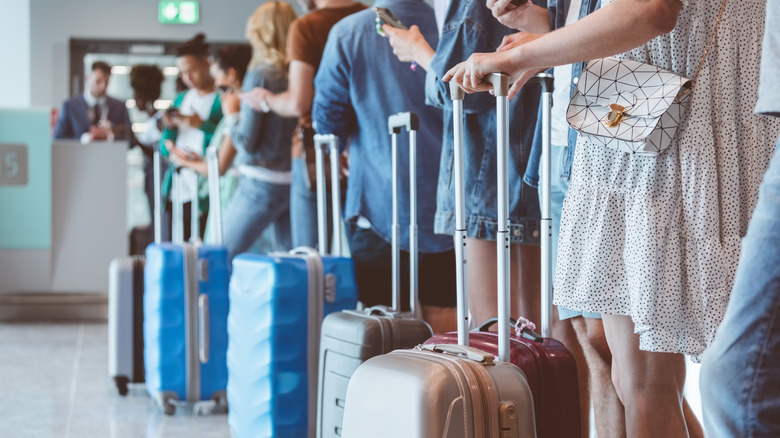
Crowds, particularly during a weekend or holiday, can be a big stressor at the airport. Dr. Scarlet says that getting out of the crowd and having something comforting with us can help, like noise-canceling headphones. She goes on to explain: “[Comforting items, like a] pillow that somebody could hug, can actually alleviate some of our anxiety. Being able to temporarily step away to a bathroom where it’s less crowded to wash our face can [also] reduce our anxiety because putting cold water on the face and the back of our neck can actually cool the body and, therefore, reduce some of the anxiety we’re experiencing. Then, doing slow, diaphragmatic breathing can also help to better regulate our nervous system.”
Going through the security line with TSA agents who might be angry or irritated (and it’s hard to blame them) or dealing with changing rules about what we have to take off or put in bins can cause a lot of stress for some people. Dr. Scarlet reiterated that giving ourselves enough time is important, but also suggests we tell the TSA agent what we’re experiencing. “Letting the TSA agent know that we might have a particular need might be helpful in some cases to reduce some of that anxiety. Asking them to give us a moment to answer their question can be helpful. For some people, requesting a private security screen can be helpful because it can be in a different room in a less overstimulating environment.
Security and the sunflower lanyard
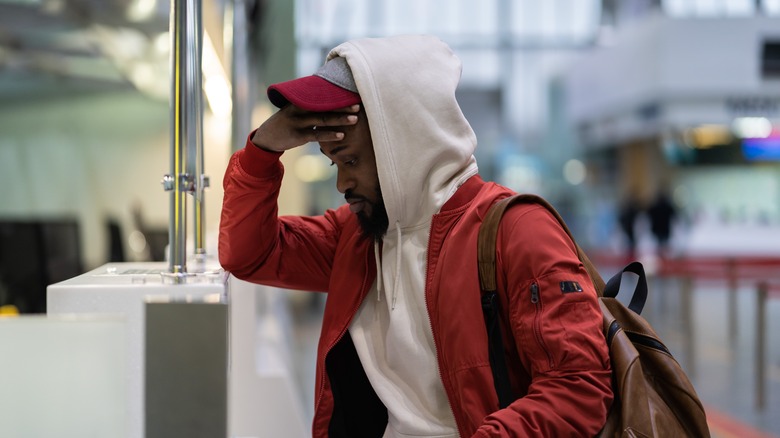
DimaBerlin/Shutterstock
What happens if you deal with body anxiety, whether it’s standing with your arms up in a body scanner at security or a physical pat down? Dr. Scarlet says that you can request having the pat down done in a private room with someone of the same gender identity. She added that you can ask for a second agent there as well. “Letting the agent know that we might have either some body pain or some trauma history can be helpful just in terms of asking them to go a bit slower, for example, or a bit gentler … many TSA agents do let people know which body parts they’re going to pat down, making it easier for folks to not be surprised.”
Dr. Scarlet had a great suggestion for people with issues that may not be visible. She said, “A tip that a lot of people don’t know about is wearing a sunflower lanyard [which signals] that you might have some kind of invisible disability, and so [TSA agents] might check in [to see] if you need anything while they’re doing a pat down.” Dr. Scarlet said that many agents are familiar with the symbol. You can see which worldwide airports (there are hundreds of them) and airlines recognize the sunflower lanyard here.
Traveling with children
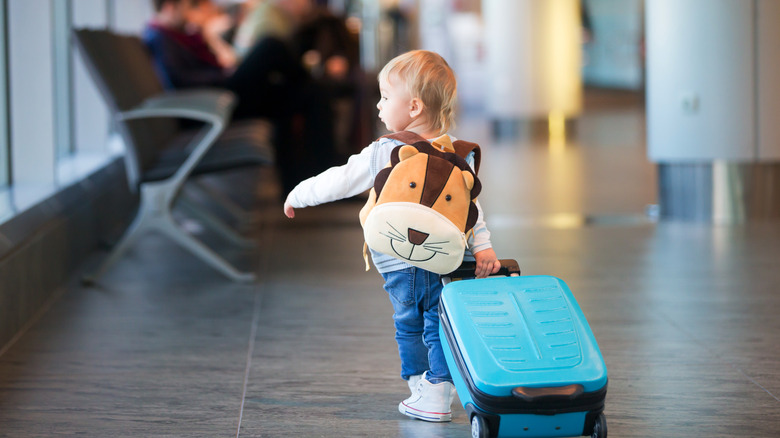
Tomsickova Tatyana/Shutterstock
When you’re bringing a child on a flight, there are a number of issues that can come up. To start with, we asked Dr. Scarlet about preventative tips to help kids deal with possible anxiety before it happens. She said, “I think for children, or really for anyone, especially with anxiety, letting them know exactly what’s coming next and what to expect can be very helpful, right? In terms of [saying to them], ‘And now we’re going to go through the security line, and here’s what’s going to happen, and then we’re going to go through this x-ray machine, and then we’re going to have to stand like this.’ Maybe even doing some practices at home can be helpful. Also, if possible, turning it into a game. For example, ‘And now we’re going to practice airplane arms.’ Kind of practicing how we might stand in the x-ray machine can make it fun.” She also suggests having a celebration of some sort afterward, like a game or a snack once you get through security.
Flying with a new baby for the first time can produce anxiety as well. Dr. Scarlet says that one tip is to let the flight attendants know that this is new for you so they can check in more frequently. She added, “Placing your hand on the center of your chest and taking some breaths, even if your baby is crying, can actually help you as the guardian to alleviate some of your anxiety, or soothe some of the anxiety, so that you can be more attuned to the baby’s needs as well.”
Dealing with difficult flights and circumstances
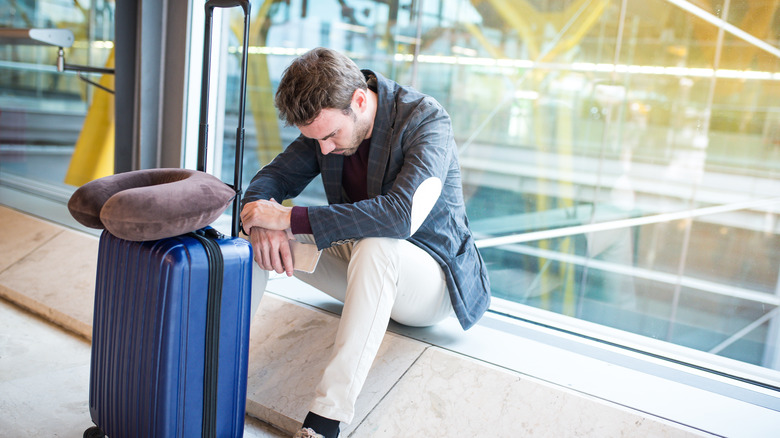
David Prado Perucha/Shutterstock
What if you’re flying for a difficult reason, like a stressful work trip or a bereavement flight? Dr. Scarlet said, “Especially if you’re flying without a support person … letting the flight attendant know can be very helpful. Flight attendants are well-trained in supporting folks on flights, so they might be able to check on you. Or sometimes the person sitting next to you, for some folks, can be really helpful.” She again suggests bringing something comforting with you or listening to a meditation on your phone. Many airlines have meditation and/or mindfulness programs on their in-flight entertainment systems, like JetBlue’s partnership with Open. She also mentioned reading a book you’ve read before. “When we’re stressed out, reading something new for some folks can be more stressful and anxiety-provoking, but rereading something that we love can be almost like a coming home.”
Passengers causing disturbances on a flight is a concern many people have these days. Dr. Scarlet said we should remember that flight attendants have training in this area. You may also find comfort in knowing where the exits are. “For some folks, just knowing that, in case of an emergency, this is the person I will notify. And in case I need to step out of this situation (if, let’s say, the plane needs to make an emergency landing), here’s the nearest exit. Or if I need to step out, let’s say to the bathroom at the airport, here’s the nearest bathroom, for example.” She said this sort of “mental rehearsal” can alleviate some stress.
What to avoid in the airport and what to embrace
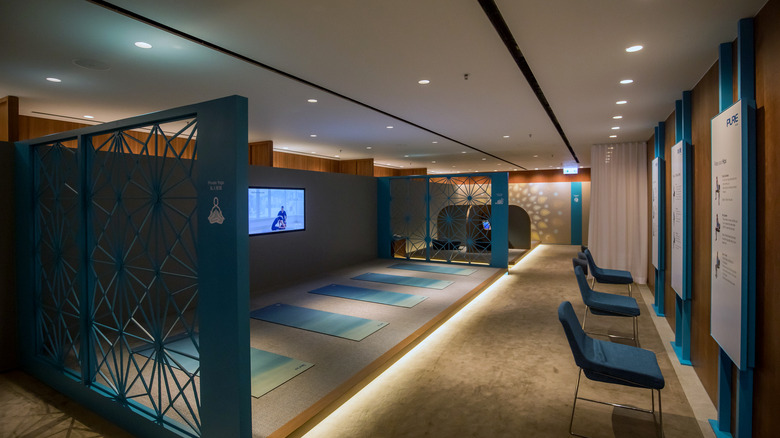
Bloomberg/Getty Images
When you’re actually in the airport, what should you avoid? Dr. Scarlet said, “I think for people with a lot of anxiety, maybe avoiding places that are more likely to be loud and crowded can be helpful. For example, if your specific gate has a lot of people in it, but you don’t have to board for a while, then maybe [set] an alarm on your phone to remind you to return to your gate before boarding. But stepping away to a quieter, less crowded area can be helpful as well so that you can, for at least a little while, reduce your overstimulation from that crowd.”
What about things in the airport that we might take advantage of, like massages or airport comfort animals? Dr. Scarlet said, “Some airports do now offer emotional support animals. It’s usually volunteers. The volunteers are taking their time and energy and walking through security lines. They’re not getting paid for this, to bring a support animal for people to pet and interact with. Some airports [now have] quiet rooms or meditation rooms. So for people with anxiety, going to a quieter place like that can be really helpful. Or asking maybe a TSA agent if there are any quiet rooms or meditation rooms available. If none are available, then maybe stepping out to the bathroom for a few minutes can be helpful as well.”

